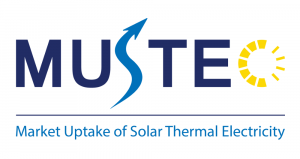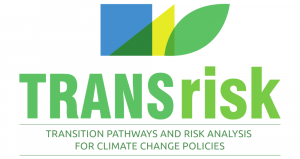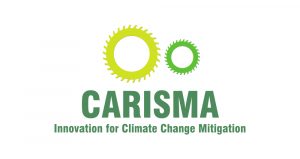INFORMATION
Address: 78 Tsamadou Str., Neoclassical bldg, 1st floor
MEMBERS
Director
Research Team
The research team of the lab consists of high-level researchers with significant distinctions at national and international level and publications in high-impact international scientific journals.
OBJECTIVE OF THE LABORATORY
The Technoeconomics of Energy Systems laboratory (TEESlab) at the Department of Industrial Management and Technology of the University of Piraeus is a multidisciplinary scientific unit that carries out research on the following (indicative) scientific areas:
- Technoeconomic analysis & evaluation of energy systems
- Energy market modelling & design of new innovative market mechanisms
- Management of energy resources
- Energy efficiency technologies
- Technologies for better utilization of Renewable Energy Sources
- Energy system analysis & planning
- Security and reliability of energy supply
- Energy system modelling, simulation and scenario development
- Distributed Energy Systems & Smart Grids
- Analysis and modelling of energy consumer and producer behaviour
- Development and application of consultation methods with energy market stakeholders
- Green Economy applications
- Energy and Climate Policy tools
- Design, Monitoring, Evaluation & Analysis of Energy and Climate Policy Impacts
The laboratory produces high level research & advisory work in the areas of techno-economic analysis of energy systems, energy & environment management, energy planning and energy and climate policy. The lab also participates in national, European and international research projects and develops strong links with Greek and foreign universities and research centers, as well as with important Greek and foreign stakeholders.
CURRENT & COMPLETED PROJECTS
Sustainable Energy Transitions Laboratory (SENTINEL)
2019 – 2022

SENTINEL will develop, test and make freely available a modelling framework that will allow stakeholders to address the critical challenge of redesigning the energy system around non-fossil energy sources. The modelling framework will be developed in a RES-based manner, rather than just considering a rising share of RES. Central pillar of the project is the modularity of the modelling framework; a set of highly specialized models will be able to be linked together, according to relevant users’ needs. Innovation of the project is that models and their data will be fully open-source and transparent/documented, facilitating their understanding by end-users and enhancing their trustworthiness. Furthermore, the development of standard protocols for linking information flows between them, will allow new models to be added to the framework, as new challenges or issues requiring investigation, arise. Final target of the project is the development of a platform containing the modelling framework the relevant data, supporting material to assist in its use, results from case studies, tutorials and other e-learning material.
Enhancing at an Early Stage the Investment Value Chain of Energy Efficiency Projects (Triple-A)
2019 – 2022
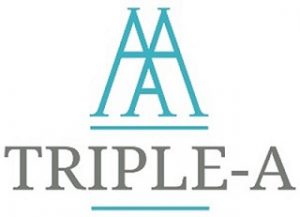
The project aims at recognizing energy efficiency investments that promote sustainable development, while setting a strong foundation for achieving the European energy efficiency targets for 2030 and 2050. A key problem of energy efficiency investments is the difficulty of fund raising, given the mistrust of financial institutions about the profitability of the investment. The main pillar of the project is to integrate the individual risk components that exist in such investments and to provide the necessary tools to project promoters and financial institutions to assess their financial viability during the design phase. Project innovation in this direction is the Triple-A (assess-agree-assign) methodology, which (i) performs an ex-ante evaluation of the available investment tools and the risks of the investment, (ii) evaluates investments according to Key Performance Indicators and finally (iii) matches investments with the appropriate financial instruments. The ultimate goal of the project is to make energy efficiency investments more transparent and attractive to project promoters and financial institutions, contributing to the achievement of the set goals.
Enhancing the Implementation and Monitoring and Verification practices of Energy Saving Policies under Article 7 of the EED (ENSMOV)
2019 – 2022
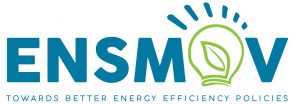
ENSMOV aims to support the EU Member States in monitoring, reviewing, improving and implementing energy efficiency policies, addressing practical and strategic issues arising from the implementation of Article 7 of the European Directive for energy efficiency. The aim is to guide Member States in designing short-term improvements to existing policies while designing long-term plans that will improve policy interactions. To achieve this goal, ENSMOV will (i) help to disseminate knowledge and experience among the participating Member States on the implementation of policies that meet the requirements of Article 7 through local, national or international communication channels, (ii) develop appropriate tools that are based on the needs of the participants and aim at more effective implementation of Article 7, and (iii) contribute to the improvement of monitoring, reporting and verification (MRV) of energy efficiency policies. Finally, the project aims at creating a best practice exchange platform/community on the development and implementation of energy efficiency policies, which will remain active after the end of the project, enhancing cooperation between policy makers and other stakeholders.
In the light of the EU 2030 Climate and Energy framework, MUSTEC aims to explore and propose concrete solutions to overcome the various factors that hinder the deployment of concentrated solar power (CSP) projects in Southern Europe capable of supplying renewable electricity on demand to Central and Northern European countries. To do so, the project will analyze the drivers and barriers to CSP deployment and renewable energy (RE) cooperation in Europe, identify future CSP cooperation opportunities and will propose a set of concrete measures to unlock the existing potential. To achieve these objectives, MUSTEC will build on the experience and knowledge generated around the cooperation mechanisms and CSP industry developments building on concrete CSP case studies. Thereby we will consider the present and future European energy market design and policies as well as the value of CSP at electricity markets and related economic and environmental benefits. In this respect, MUSTEC combines a dedicated, comprehensive and multi-disciplinary analysis of past, present and future CSP cooperation opportunities with a constant engagement and consultation with policy makers and market participants. This will be achieved through an intense and continuous stakeholder dialogue and by establishing a tailor-made knowledge sharing network. The MUSTEC consortium consists of nine renowned institutions from six European countries and includes many of the most prolific researchers in the European energy policy community, with very long track records of research in European and nationally funded energy policy research projects.
The overall aim of PROSPECT is to enable peer to peer learning in regional and local authorities in order to finance and implement their sustainable energy plans. The learning will empower them to make use of best practices in developing financing for these plans, which have been implemented successfully in other cities and regions in the EU. The specific objectives of PROSPECT are:
- to develop and execute a complete and easily replicable peer to peer learning program addressing at least 180 local and regional authorities through prominent local and regional associations and agencies. The learning program will be focussed on the development of financing schemes for implementing the local authorities’ energy efficiency and sustainable energy and climate action plans (SECAP). Given that the topic on financing is quite broad, the learning program is structured in five modules (each one representing a sector relevant to the above mentioned plans) namely public buildings, private buildings, transport, public lighting and cross-sectoral. Within each module, concrete guidance for developing financing schemes will be provided,
- to create effective and productive peer-to-peer groups among regional and local authorities and agencies within and outside consortium partners, in order to ensure the exchange of experience and expertise,
- to build partnerships that will stimulate mutual understanding of each other’s issues, situations and challenges with the aim of exploring new ideas, options and solutions,
- to identify and set up proper replication mechanism for the learning programs available to regions/cities beyond the consortium network and the project’s duration.
Transitions pathways and risk analysis for climate change mitigation and adaptation strategies (TRANSrisk)
2015 – 2018
Both the models concerning the future climate evolution and its impacts, as well as the models assessing the costs and benefits associated with different mitigation pathways face a high degree of uncertainty. In this respect, there is an urgent need to not only understand the costs and risks associated with climate change but also the risks, uncertainties and co-effects related to different mitigation pathways as well as public acceptance (or lack of) of low-carbon (technology) options. The main aims and objectives of TRANSrisk therefore are to create a novel assessment framework for analysing costs and benefits of transition pathways that will integrate well-established approaches to modelling the costs of resilient, low-carbon pathways with a wider interdisciplinary approach including risk assessments. In addition TRANSrisk aims to design a decision support tool that should help policy makers to better understand uncertainties and risks and enable them to include risk assessments into more robust policy design.
Coordination and Assessment of Research and Innovation in Support of climate Mitigation Actions (CARISMA)
2015 – 2018
CARISMA, through effective stakeholder consultation and communication leading to improved coordination and assessment of climate change mitigation options, it aims to benefit research and innovation efficiency as well as international cooperation on research and innovation and technology transfer. It seeks to assess policy and governance questions that shape the prospects of climate change mitigation options, and discuss the results with representatives from the CARISMA target audiences to incorporate what can be learned for the benefit of climate change mitigation.
ENSPOL will conduct a robust analysis of Energy Efficiency Obligation (EEOs) schemes and potential alternative measures or additional policies across and beyond European Member States (MS) countries, supporting those towards implementing the article 7 of the 2012/27/EU directive on energy efficiency (EE). ENSPOL will develop guidelines for the design and implementation of robust EEOs and alternative measures. Building on traditional methods (conferences, workshops, newsletters etc.) more innovative approaches such as “train the trainer” for policymakers, the establishing of permanent observatories both at EU and national level and the creation of a web based platform will be used to provide MS access to information and guidance on all issues relating to the implementation of Article 7.
A Best Practice Platform to support the Transition towards a Green Economy (GreenEcoNet)
2013 – 2016
GreenEcoNet will address the current dialogues on issues related to ‘Green Economy’ and ‘Green Growth’ through a series of activities, along with the design and the use of an online Platform aimed at developing an exchange network of best practices involving the best in class private enterprises, the academic research institutions, business networks and the wider business community, with a special focus on SMEs. Furthermore, it will address the disconnection between best in class/benchmark “green business” practices and the wider business communities, along with the disconnection between applied research institutions investigating models for a transition to a “green economy” and the business community.
POLIMP identified knowledge gaps about implications of possible directions of international climate policies. Subsequently, these gaps were covered with knowledge packages derived from a broad range of existing reports, research and climate policy decisions. With these information packages, climate policy associated stakeholders will be better able to extract key policy conclusions. In addition, POLIMP provides an overall, on-line platform for information exchange of a wider list of contemporary and future climate policy initiatives.
Assessment of Policy Interrelationships and Impacts on Sustainability in Europe (APRAISE)
2011 – 2014
The project will provide policy makers with an improved understanding of the efficiency, effectiveness and efficacy of existing and potential environmental policies impacts and their interactions at both the European and Member State level by taking into consideration the social, environmental and economic dimensions of sustainable development. Furthermore, the project will offer guidance on ex-ante policy impact assessment and come up with general policy recommendations. The project will therefore assist policymakers in reducing inefficiencies in policy design and to create win-win situations whereby economic strength goes hand in hand with environmental protection and efficient use of natural resources.




